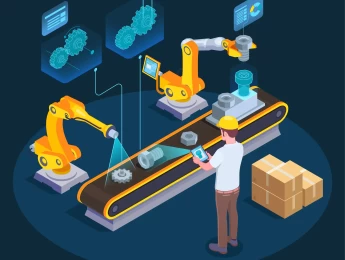It is crucial to have a thorough understanding of how material processing works within a manufacturing organisation. A manufacturing organisation will deal with various materials, all with their own properties and processing requirements. Without significant knowledge of these materials, quality is guaranteed to be severely lacking.
There are many stages in processing materials for the desired product. Each material has its own unique properties, which greatly influence how it is heated, handled, and shaped. Those responsible for working through this process must be highly competent with all the materials and must understand ideal handling techniques and what machines and tools would be most suitable to use to reach the desired outcome.
A thorough understanding of the welding process is also essential. Welding is the process of joining materials together securely. Different materials can be attached through this method, and those responsible must understand each stage of the process to complete it successfully.
Upon completion of this course, participants will be able to:
- Understand the importance of material processing within manufacturing.
- Identify and explain the different materials used within manufacturing and why.
- Acknowledge the consequences of poor material processing.
- Assess the various processing operations of metals and plastics.
- Recognise the influence of effective product and machine process design.
- Estimate and calculate the amount of energy and power needed throughout material processing.
- Describe the aspects of stress in metal forming and how to compensate for it.
- Develop various skills, such as welding, to increase the structural strength of materials.
This course is designed for anyone responsible for metal processing within manufacturing. It would be most beneficial for:
- Senior Engineers
- Quality Control Managers
- Plant Managers
- Procurement Officers
- Material Process and Development Engineers
- Operations Managers
This course uses a variety of adult learning styles to aid full understanding and comprehension. Participants will review real-world examples of finished processed materials to highlight key features, identify material properties, and how this would have impacted the processing techniques.
To ensure the participants develop a full understanding of the taught content, they will participate in a variety of different learning methods and exercises, including presentations, demonstrations, and individual and group activities. This combination of activities will allow the participants full opportunities to process the knowledge and practise any relevant practical skills.
Day 5 of each course is reserved for a Q&A session, which may occur off-site. For 10-day courses, this also applies to day 10
Section 1: Fundamentals of Material Processing
- Understanding the purpose of material processing, its necessity and importance.
- Identifying what materials are typically utilised and how they must be processed.
- Exploring the characteristics of different materials dictates how they must be processed.
- Assessing the technical properties of polymers and composites.
- Investigating the thermal properties of ceramics.
- Examining the mechanical properties of different metals.
Section 2: Solidification Process
- Describe what solidification processes are within manufacturing and why they are needed.
- Identifying what materials will be used for and adjusting the solidification process as necessary.
- Understanding each stage of metal casting – pattern making, molding, pouring, shakeout and heat treatment and inspection.
- Exploring traditional and new technologies that aid in rubber and ceramics processing.
Section 3: Metal Forming and Sheet Metalworking
- Analysing the different types of metal commonly used and their specific properties.
- Examining how a metal’s specific qualities influence the way it must be worked and formed.
- Assessing different metal forming processes and how they may be beneficial for different items – rolling, forging, wire drawing, extrusion, deep drawing and bending.
- Utilising dies and presses to ensure each sheet is consistent and meeting quality expectations.
Section 4: Metal Machining
- Types of machines used throughout the metalworking process and their primary functions.
- Understanding how to use each machine efficiently and safely.
- Identifying each feature of common metal working machines and describing their purpose.
- Assess the separate tools that can be used in addition to or in replacement of a larger machine.
- Recognising when it is most suitable to use each machine or tool.
Section 5: Welding Technology
- Understanding the purpose and necessity of welding.
- Identifying what materials can be welded and how the process and techniques may vary depending on the material.
- How to prepare the tools and materials to be welded.
- Ideal welding techniques and how to achieve the ideal finish.
- Common welding defects and utilising techniques to avoid them.
Upon successful completion of this training course, delegates will be awarded a Holistique Training Certificate of Completion. For those who attend and complete the online training course, a Holistique Training e-Certificate will be provided.
Holistique Training Certificates are accredited by the British Assessment Council (BAC) and The CPD Certification Service (CPD), and are certified under ISO 9001, ISO 21001, and ISO 29993 standards.
CPD credits for this course are granted by our Certificates and will be reflected on the Holistique Training Certificate of Completion. In accordance with the standards of The CPD Certification Service, one CPD credit is awarded per hour of course attendance. A maximum of 50 CPD credits can be claimed for any single course we currently offer.
- Course Code IND14-102
- Course Format Classroom, Online,
- Duration 5 days














